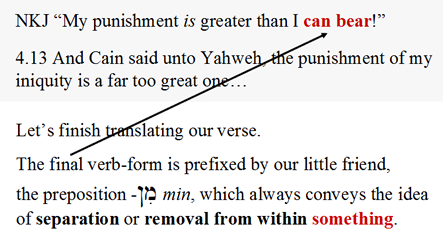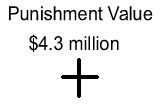The Friendly Fire Room Presents
Listen And See
Thank you Wanda Barlow for this great idea!
Genesis Framework Part 45
Genesis Framework Pt 45
Genesis Framework
GF 45 Genesis 4.13
July 17, 2016
Part 45
Genesis 4:13-14
15 And the LORD said to him, "Therefore, whoever kills Cain, vengeance shall be taken on him sevenfold." And the LORD set a mark on Cain, lest anyone finding him should kill him.
16 Then Cain went out from the presence of the LORD and dwelt in the land of Nod on the east of Eden.
Genesis 4:13-14
13 And Cain said to the LORD, "My punishment is greater than I can bear!
14 "Surely You have driven me out this day from the face of the ground; I shall be hidden from Your face; I shall be a fugitive and a vagabond on the earth, and it will happen that anyone who finds me will kill me."
punishment hidden
can bear fugitive
have driven vagabond
face of the ground finds
NKJ “My punishment is greater than I can bear!”
First, let’s come to a conclusion on what the New King James Version is telling us, and consider possible implications from it.
This seems to be a straight-forward expression from Cain in response to God’s pronouncement of judgment upon him for having killed his brother Abel.
The relationship within the sentence structure is that of a comparison, where the weight-magnitude of God’s punishment is balanced over against the weight-magnitude of Cain’s estimation of his ability to endure it.
It also seems to be a plea from Cain, a cry for mercy from God to lessen the weight of his punishment after having been judged guilty by God for sins committed.
One possible implication is that Cain’s special pleading is designed as a reminder to God to give reconsideration the frailty of the makeup of mere men, and to beg His mercy to reduce his punishment, especially since Cain appears to be operating from a presupposition that God is always righteous and just in all judicial matters, willing to consider all aspects of fairness.
In light of these observations, does Cain’s appeal seem to be reasonable?
What does the Hebrew have to say?

By more accurately translating Cain’s protest from the Hebrew, we should get a better overall perspective of what is actually going on here.
Thus far…
4.13 And Cain said unto Yahweh, the punishment of my iniquity is a far too great one…

NKJ “My punishment is greater than I can bear!”
4.13 And Cain said unto Yahweh, the punishment of my iniquity is a far too great one…

The “something” referenced by the “to bear something” is that which Cain has already borne, and subsequently he is looking to get out from within that place; namely, the place characterized by a burden of guilt.
Translation:
Literal: …to remove (me) from this place where (I) presently bear the burden of guilt.
Combined:
4.13 And Cain said unto Yahweh, the punishment of my iniquity is a far too great one to remove (me) from this place where (I) presently bear the burden of guilt.
If you read this thoughtfully, you will begin to see it.
What is the purpose of the punishment?
The punishment is designed to pay off two aspects of the sin debt;
1. to pay off the sin debt offense accountable to God.
2. to remove the burden of the guilt debt from the sinner.
Keep in mind that Cain has already shown himself to be one who will always reject God’s provisional offer of a substitutionary atonement for his sin, preferring to work on his own, without God’s help.
This is what is implied:
…that a less harsh punishment would be sufficient to remove Cain’s burden of guilt.
This might be a bit difficult to comprehend immediately,
but the idea expressed by the preposition of separation and removal (-min) that is fixed to the infinitive “to bear,” implies that Cain’s understanding of the purpose of
the punishment from God was in order to remove him
from being in a present uncomfortable place; namely, a
place characterized by the burden of his guilt.
Cain wanted out of that place, but at a price that was reasonable in terms of his estimate as to its value.
Punishment Value Sin/Guilt Debt
$7.7 million $3.4 million
There’s something missing, let’s look at the whole matrix…
Punishment Value
$7.7 million
Sin/Guilt Debt
$3.4 million
There’s something missing, let’s look at the whole matrix…






![]()


In effect, Cain was saying, “Yahweh, I’m willing to pay off the $3.4M portion that bothers me, but I’m not interested in servicing the $4.3M part that bothers You!”
So, as we investigate this verse in the Hebrew language, we discover that Cain is not referring to the potential burden of his punishment as if it would press down upon him to a far greater than his ability to bear, but that weight of the punishment the Lord had just placed upon him for his iniquity was beyond what he felt would be necessary to remove the only burden he personally cared about; namely, his sense of guilt.
In other words, Cain is complaining in protest to the Lord as being “unfair” and “unjust” in the rendering of the punishment due Him to remove the guilt.
Lord, I say, Your standards are not equitable in terms of my standards.
Cain is not pleading for God’s mercy, he is acting as judge of His righteousness, accusing the Lord of un-righteousness!
That’s quite a story, isn’t it?
Have you heard its ongoing sequel recently?
DRA Genesis 4:13
And Cain said to the Lord: My iniquity is greater than
that I may deserve pardon.
LXE Genesis 4:13
And Cain said to the Lord God, My crime is too great for
me to be forgiven.
4.13 And Cain said unto Yahweh, the punishment of my iniquity is a far too great one to remove (me) from this place where (I) presently bear the burden of guilt.
Many will be surprised on the Day of Judgment when they discover that it was just as the Word of God says; only the righteousness of Christ is able to save you.All men are sinners and no one can save himself. God is just, so He must punish sin; but He is also merciful, moreover gracious, and offers His Son as the perfect sacrifice in order to purchase a place for you in heaven, which He offers to you as the free gift of eternal life. As we continue to examine man’s earliest duties with regard to the covenant of works, although they can be categorically divided into two distinct types of classes; one in relationship with God, and the other in relationship with fellow man, all covenant stipulations are expressions of the will of the Lord. The law of the covenant is the law of man’s image-sonship.
Jesus is God Incarnate
In order to pay the debt of our sins, He came from Heaven, having been sent by the Father, where He lived a life of perfect obedience to the Father even unto the shameful death upon the cross in order to pay the debt of your sins.This gift must be received by faith, believing that Jesus’ perfect life and Cross Work was His complete and necessary Atonement for your sins, in your behalf.Faith is a gift that comes by the Power of God the Holy Spirit working in a person’s innermost being. The Holy Spirit has the authority and power to quicken your dead spirit, to make it come to life. If you have not done so before this moment, ask Jesus to forgive you your sins, tell Him you’ve stop trying to be your own savior, and ask Him to come into your life right now, and to give you eternal life. Then, in faith believing, thank Him for the gift that He is giving you, the one He paid for in full in your place, in Jesus’ name,AMEN
Copyright July, 2016
Rev. Jim Craig
All Rights Reserved